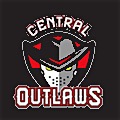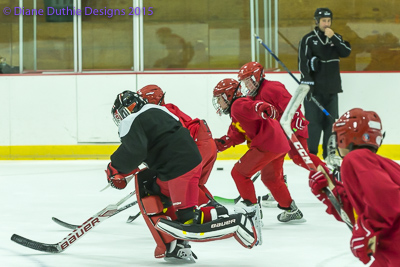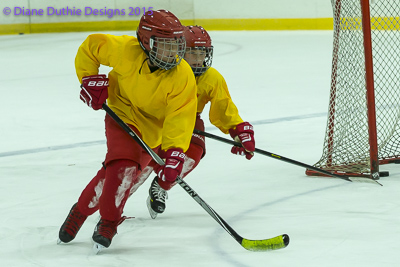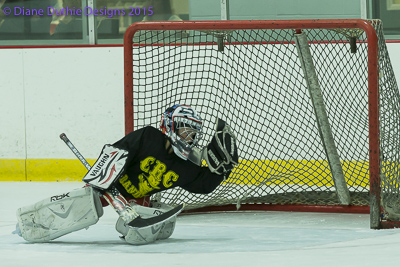- By Dan Veaner
- Around Town
 Print
Print  This Fall marked the start of the new Finger Lakes Regional Hockey Association (FLRHA), based at the RINK. The new USA Hockey-affiliated association adds to the mix of options offered by the established Ithaca Youth Hockey and Tompkins Girls Hockey Association. Squirt Travel Coach and Safe Sport Coordinator Jay Sciarabba says the Lansing-based association is an attempt to restore excitement about youth hockey.
This Fall marked the start of the new Finger Lakes Regional Hockey Association (FLRHA), based at the RINK. The new USA Hockey-affiliated association adds to the mix of options offered by the established Ithaca Youth Hockey and Tompkins Girls Hockey Association. Squirt Travel Coach and Safe Sport Coordinator Jay Sciarabba says the Lansing-based association is an attempt to restore excitement about youth hockey."Were trying to get back to the old days of hockey," he says. "Our mission is to have a successful house program for kids to have that ability, and then the kids who want to play travel will have that ability, too. It's fun because there's a buzz here that we haven't had in a long time. That's what we want to get back to. Can Tompkins County survive with two associations? Yes it can. Our philosophy is that any kid in Tompkins County should have the ability to play recreational hockey. All the kids are the same. They all have the same color socks, the same color pants, gloves and helmets. So they're all on the same playing field. We're making the association more family oriented so everybody is the same."
FLRHA grew from from a successful house league program offered last year. 'The Bandits' program wasn't USA Hockey affiliated, but it offered a program where kids could come for recreational play. With the success of that program came the Finger Lakes Regional Hockey Association. It has a house league program plus three travel teams: Squirt travel team (8 and 9 year olds), Peewee (9, 10 and 11 year olds), and Bantam (12 and 13 year olds). The travel teams are set at the beginning of the season, but kids can join the house program just about any time.
Under USA Hockey you also have to have a Mites program (6 and 7 years olds) and Initiation (for as young as three years old). The RINK offers free Initiation sessions Fridays, Saturdays and Sundays. To participate kids have to register for USA Hockey and get their equipment from Instant Replay (the sporting goods store at the RINK), what Sciarabba characterizes as a modest investment.
 The Bandits - Photo by Diane Duthe
The Bandits - Photo by Diane DutheThe teams are on the ice at least four days a week. It's a six month program that runs from September through March. Kids practice 'drills and skills' two times a week. Each team practices an additional day, and home games are played at the RINK every Sunday at 10:45 through March. On Saturdays when there is an away game the travel teams play a fifth day.
"Some people think that's a lot," Sciarabba says. "Some people think it's perfect. And it's a choice. That's what we're offering people -- a choice."
Sciarabba says there has been a decline in sports participation in recent years. He recalls the home league he played in as a child, and says the FLRHA board wants to restore the kind of excitement that existed then.
 Photo by Diane Duthe
Photo by Diane Duthe"We're trying to get kids back involved," he says. "In the last few years I've seen a decline in sports in general, not just hockey. I think it is 'screen-related'. It's a big baby sitter. Parents will say you're not going to play a sport, but go play with your X-Box, or here's your iPad. It's cheaper. So we're trying to get that passion back. That is why my Dad built this rink -- for youth hockey."
With so many stories about sports-related concussions in the news, FLRHA coaches are trying to be proactive about safety. About 16 coaches take 'Safe Sport' modules offered by USA Hockey, about a half dozen hours of safety protocol training on concussions, bullying and other topics.
"We have a lot of protocols in place," says Sciarabba. "Concussions are a huge issue in people's minds. The safety feature for the parents... do we do too much? I don't think you can do too much. We're educating ourselves more as coaches and as a facility and as an association. We're also educating the parents more, and we're very strict with our guidelines for the concussion protocol... any safety protocols."
 Photo by Diane Duthe
Photo by Diane DutheHe adds that playing on a team is as much about life lessons as it is about learning hockey and skating skills.
"As much as I'm going to coach you on the ice, you're going to have to learn things off the ice," he says. "Respecting the facility, respecting parents, respecting your team mates. We're checking on home work. Because that's part of growing. Our goal is to teach these kids that you're not always going to be told 'yes' in life. There are going to be 'nos' and you're going to have failures. But it's OK to fail because it's going to make you stronger and make you work harder."
Sciarabba is encouraged by the early success of the program. FLRHA is offering spring and summer programs to augment the regular season. 123 kids signed up last summer. FLRHA officialsare hoping to maintain that momentum.
"After 20 years were trying to get that passion back," he says. "We want people to come to this facility and be scared to play us. We were afraid that wouldn't happen. The Community Recreation Center (the umbrella organization that maintains and manages the RINK and the FIELD) has backed us to get that youth passion back. It's not just to get the kids back in here to be D1 or to go pro. My thing is to have this facility when these kids are 40 or 50 years old and have their kids use it long term. It's community."
v11i46



